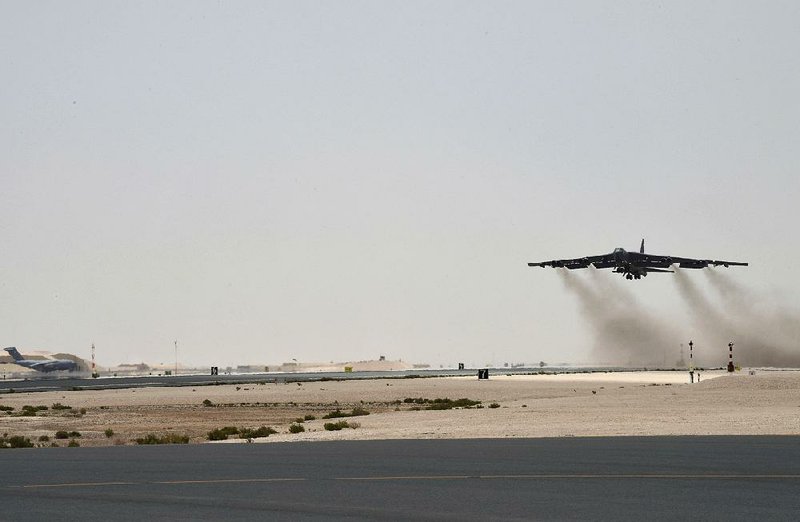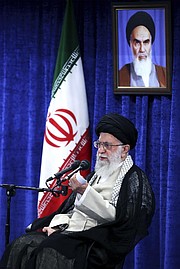President Donald Trump rejected a report that his administration is planning for war with Iran, but then warned he'd send "a hell of a lot more" than 120,000 troops to the Middle East in the event of hostilities.
"I think it's fake news, OK?" Trump told reporters outside the White House on Tuesday after he was asked about a New York Times report that plans envision sending 120,000 U.S. troops to fight the Islamic Republic.
"Now would I do that? Absolutely," Trump added. "But I have not planned for that. If we did that, we'd send a hell of a lot more troops than that."
Tensions are rising with Iran after the Trump administration revoked waivers this month that allowed Iran to continue selling oil to some customers despite U.S. sanctions. Saudi Arabia and the United Arab Emirates on Monday reported mysterious attacks on several vessels including oil tankers in the Persian Gulf, and the Iran-backed Houthi rebels in Yemen claimed on Tuesday that they had used drones to damage Saudi oil pumping stations earlier that day.
Iran's Supreme Leader Ayatollah Ali Khamenei said on Tuesday that neither his country or the U.S. want war, according to the semi-official Tasnim News. The U.S. knows that war won't benefit it and the only option for the Iranian people is resistance, Khamenei said at a meeting with senior officials, Tasnim reported.
The Times reported that the president's top national security aides met Thursday to discuss updated war plans with Iran. The plans envision sending as many as 120,000 troops to the Middle East should Iran attack American forces or accelerate work on nuclear weapons, the Times said.
The report said the plans do not call for a land invasion of Iran, which would require many more troops.
A spokesman for the White House National Security Council, Garrett Marquis, declined to comment on the accuracy of the Times story. He said in a statement that Trump has been open to talks with the Iranian leadership and made clear that "the United States does not seek military conflicts with Iran."
But he added: "Iran's default option for 40 years has been violence and we are ready to defend U.S. personnel and interests in the region."
Meanwhile, a senior officer said on Tuesday that the U.S.-led military coalition combating the Islamic State has detected no greater recent threat to its troops in Iraq or Syria from forces backed by Iran.
"No, there's been no increased threat from Iranian-backed forces in Iraq and Syria," British Maj. Gen. Chris Ghika told reporters at the Pentagon in a video conference from coalition headquarters in Baghdad. "We're aware of their presence, clearly, and we monitor them, along with a whole range of others because that's the environment we're in."
His comment comes as administration officials say they have detected signs that Iranian or Iranian-backed proxies were preparing for possible attacks against American interests in the Middle East. The administration cited the threats as the reason for expediting the deployment of an aircraft carrier strike group and other military resources to the region.
Late in the day, the U.S. Central Command said Ghika's remarks "run counter to the identified credible threats" from Iranian-backed forces in the Middle East. In a written statement, Central Command said the coalition in Baghdad has increased the alert level for all service members in Iraq and Syria.
"As a result, [the coalition] is now at a high level of alert as we continue to closely monitor credible and possibly imminent threats to U.S. forces in Iraq," the statement said.
Separately, Spain's decision to remove a frigate on training exercises from the U.S. combat fleet that is approaching the Persian Gulf was made purely for "technical reasons," the country's Defense Minister Margarita Robles said Tuesday.
Robles insisted the decision was "not an expression of distaste" over the crossing into the Strait of Hormuz by the fleet headed by the USS Abraham Lincoln aircraft carrier.
Robles insisted Spain's decision was "prudent" and "perfectly admissible" under the terms of a two-year cooperation agreement that placed the Mendez Nunez frigate with the U.S. fleet for advanced training. The ship and its 215 people on board have headed to Mumbai, India, she added.
"The United States government has embarked on a mission that wasn't scheduled when the agreement was signed," Robles told reporters during an official trip to Brussels.
She said Spain had never given its blessing for the frigate to go on a mission in the Persian Gulf and that it will return to the U.S. fleet once scheduled operations resume.
Information for this article was contributed by Justin Sink, Margaret Talev and Golnar Motevalli of Bloomberg News; and by Robert Burns, Lolita C. Baldor, Matthew Lee, Zeke Miller and staff members of The Associated Press.
A Section on 05/15/2019

